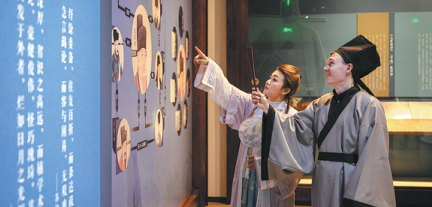Liaoning province in Northeast China has rolled out its education plan for the years from 2021-25, with an emphasis on curriculum reform and students' physical and mental health.
During the 14th Five-Year Plan period (2021-25), Liaoning will work to enhance the accessibility, affordability, safety and quality of preschools, said Hua Lei, deputy head of the Liaoning Department of Education.
"Our goal for 2021 is to enroll 46 percent of children in public kindergartens by year's end," she said.
The province will also see to it that primary schools and junior middle schools enroll students based on geographic proximity and do not hold entrance examinations.
On the higher education front, Liaoning will carry out curriculum reform to better meet industry needs.
"We encourage colleges and universities to develop programs in basic sciences that are able to support the innovative and sustainable development of Liaoning," Hua said.
Among the encouraged academic fields are digital technology, intelligent manufacturing, integrated circuits, agriculture and medicine.
Researchers at local colleges and universities are encouraged to focus on areas including new materials, seed safety, biological safety, artificial intelligence and biomedicine.
A committee of experts will be set up to advise college graduates on finding jobs or starting businesses.
Liaoning will improve vocational education by promoting cooperation between schools and employers.
"We will build a group of exemplary professional development bases and vocational schools," Hua said. "An institution will be established to train cooks specializing in Liaoning cuisine."
Students' physical and mental well-being will be another focus for Liaoning's education authority.
Hua said the province will step up psychological education to enhance students' ability to cope with setbacks and adapt to the environment.
Greater attention will also be paid to the amount of homework for primary and middle school students, their quality of sleep, extracurricular reading, physical health and how much time they spend on mobile phones.
Hua stressed that the province will take a firm hand in regulating off-campus tutoring services so as to liberate students from extra work, and also to liberate parents from sending and picking up their children and paying for those classes.
Hua said Liaoning "made historic achievements" in education during the 13th Five-Year Plan period (2016-20).
As of the end of 2020, preschools for children aged 3-6 reported a gross enrollment rate of 88.6 percent, an increase of 22 percentage points over that of 2015, she said, adding "more than 80 percent of the children were admitted to public-interest kindergartens".
Public-interest kindergartens refer to public or private kindergartens that provide quality preschool education at affordable prices.
Higher education in Liaoning also saw significant improvement during the period, according to Hua.
"A total of 448 undergraduate majors were included in a national program for developing first-class undergraduate majors, and researchers from Liaoning-based colleges and universities took home 29 national science awards,"Hua noted.
She said these achievements have established a solid foundation for building a high-quality education system during the 14th Five-Year Plan period.
Wu Yong contributed to this story.

International students from Liaoning University of Traditional Chinese Medicine learn about traditional Chinese culture. [Photo/China Daily]